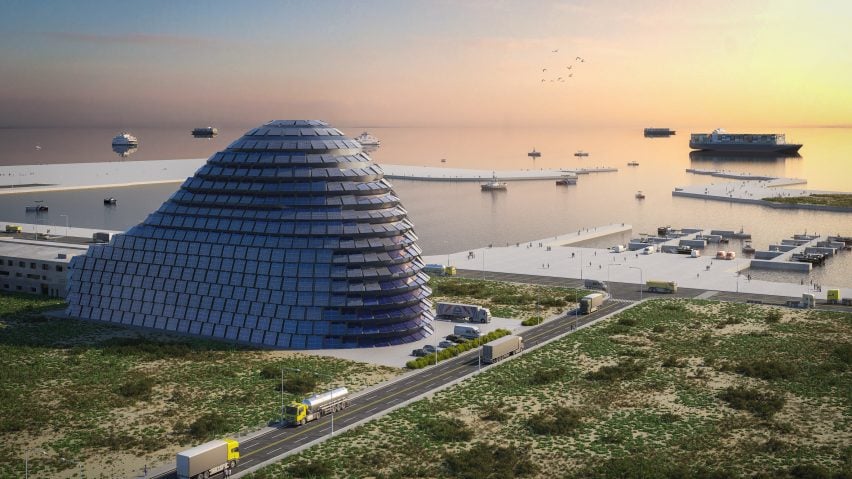Architecture studio MVRDV has released visuals of Sun Rock, a self-sufficient office and operations facility it has designed in Taiwan for the government-owned power company Taipower.
Located at the Changhua Coastal Industrial Park near Taichung, the building will be covered in angled photovoltaics and used to store and maintain sustainable energy equipment.
Sun Rock will be distinguished by its rounded form, which MVRDV has developed to maximise the amount of sunlight its photovoltaic-covered facade can harness to create energy.
The southern side of the building, which faces the sun during the middle of the day, will have a large surface area that slopes gently downwards. Meanwhile, the northern edge of the building will be domed to maximise its exposure to the sun in the mornings and evenings.
MVRDV and Taipower's goal is for the building to generate enough electricity for it to be self-sustaining. Any excess that it generates will be sent to the energy grid.
"We cladded the entire facade with photovoltaics, maximising the energy gains to make it not only self-sustainable, for its own usage, but also allowing the building to become a tool of energy production, exporting electricity to the rest of the grid," explained MVRDV's co-founder Winy Maas.
"This is achieved through a maximally efficient positioning of the panels," he continued. "As a result, our design is completely data-driven. It's always fun to see the results when you let analysis be the determining part of the design."
Alongside the storage and maintenance facilities, Sun Rock will contain offices, workshops and a public gallery.
According to MVRDV, it is being built in anticipation of "Taiwan's planned transition to green energy" and is hoped to reflect the goals of energy company Taipower.
"Of course, we aim to make all of our projects as sustainable as possible," added Maas. "Yet we see that projects can go beyond just being sustainable in themselves."
"This project has unique and fascinating potential", he continued. "The user is an energy company, which has allowed us to do more than usual."
Sun Rock's facade will be designed as a series of pleats used to support the photovoltaic panels and windows. The current iteration can support at least 4,000 square metres of solar panels.
This is expected to generate almost 1 million kilowatt-hours of clean energy per year, which MVRDV said is equivalent to the energy generated by burning 85 tonnes of crude oil and is enough to make the building is self-sufficient.
However, the studio is continuing to develop the design to add more photovoltaics so the building can generate up to 1.7 million kilowatt-hours annually, allowing it to contribute to the energy grid.
Inside, Sun Rock will feature a large atrium called the Data Room. This will be filled with real-time data displays about the amount of renewable energy that Taipower is generating.
The first floor of the building will contain the public gallery, which will look into Sun Rock's workshop spaces adjacent to it. These workshops will be used for the maintenance of green energy equipment, such as solar panels and wind turbine blades.
Sun Rock will be complete with exhibition space on the top floor of the building, alongside a tree-lined roof terrace for visitors and Taipower employees.
By incorporating gallery spaces into the building, MVRDV hopes Sun Rock will become "more than simply an operations and maintenance facility".
"The building is thus also an important communication tool for Taipower to publicly show their ambitions for a greener future," the studio concluded.
Rotterdam-based MVRDV was founded by Maas alongside Jacob van Rijs and Nathalie de Vries in 1991. Elsewhere, the studio is currently developing the terraced LAD headquarters in Shanghai that will also be clad in photovoltaics.
Other buildings that feature large quantities of photovoltaics include Snøhetta's carbon-negative Powerhouse Telemark office in Norway and the Kendeda Building designed by Miller Hull Partnership and Lord Aeck Sargent for Georgia Tech university the USA.
The imagery is courtesy of MVRDV.
Project credits:
Architect: MVRDV
Founding partner in charge: Winy Maas
Partner: Wenchian Shi
Design team: Hui-Hsin Liao, Daniel Diez, Mirco Facchinelli, Carolina Martin Peñuela, Chi-Yi Liao, Tseng-Hsuan Wei
MVRDV NEXT team: Yayun Liu
Visualisations: Antonio Coco, Pavlos Ventouris, Jaroslaw Jeda, Emanuele Fortunati
Co-architect: Y.C. Hsu Architect & Associates
Contractor: Reiju Construction Co., Ltd.
Structural engineer: Chih-Hung Kao Structural Engineer & Associates
MEP: Chia Feng Mechanical & Electrical Corp

